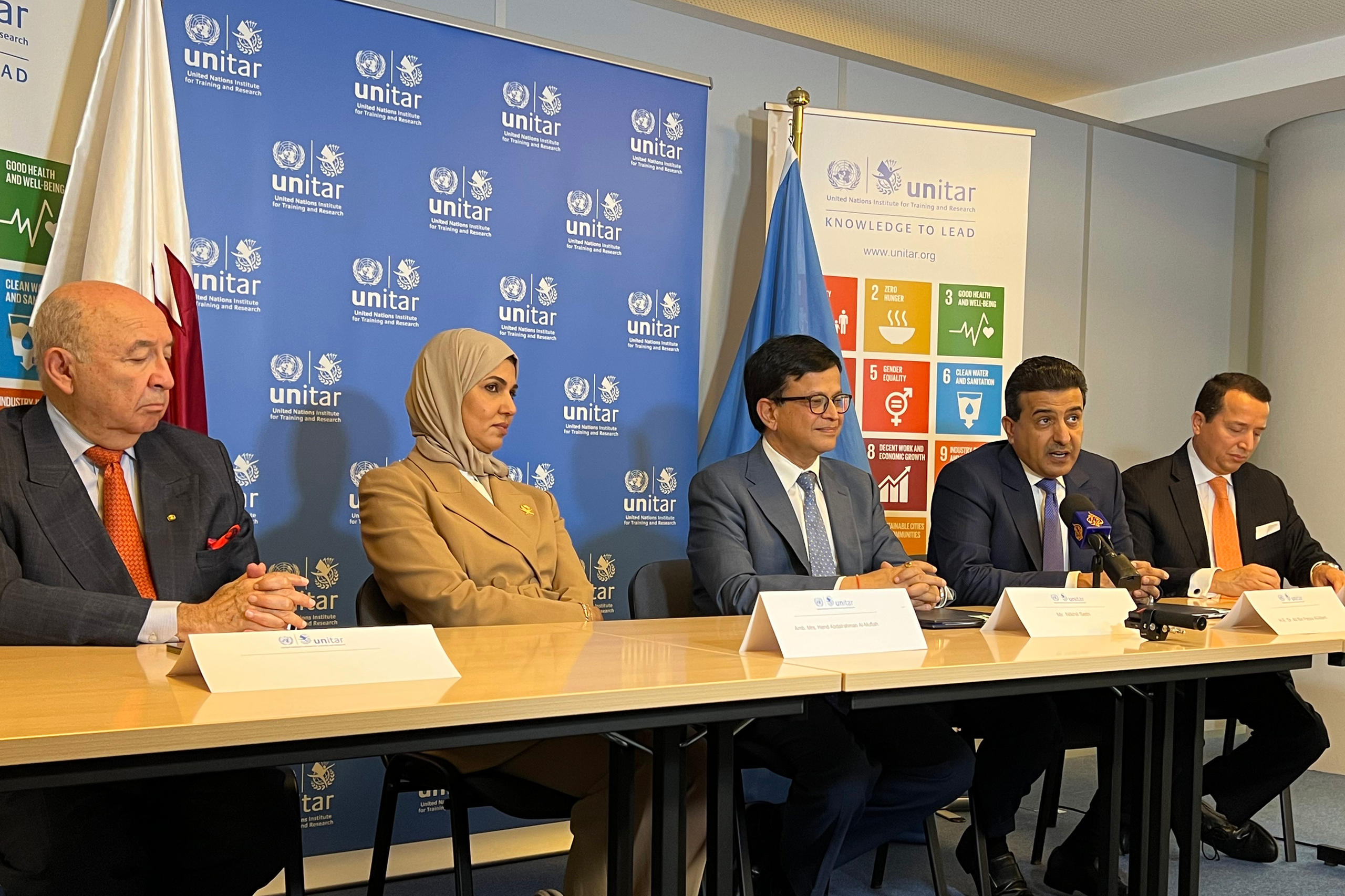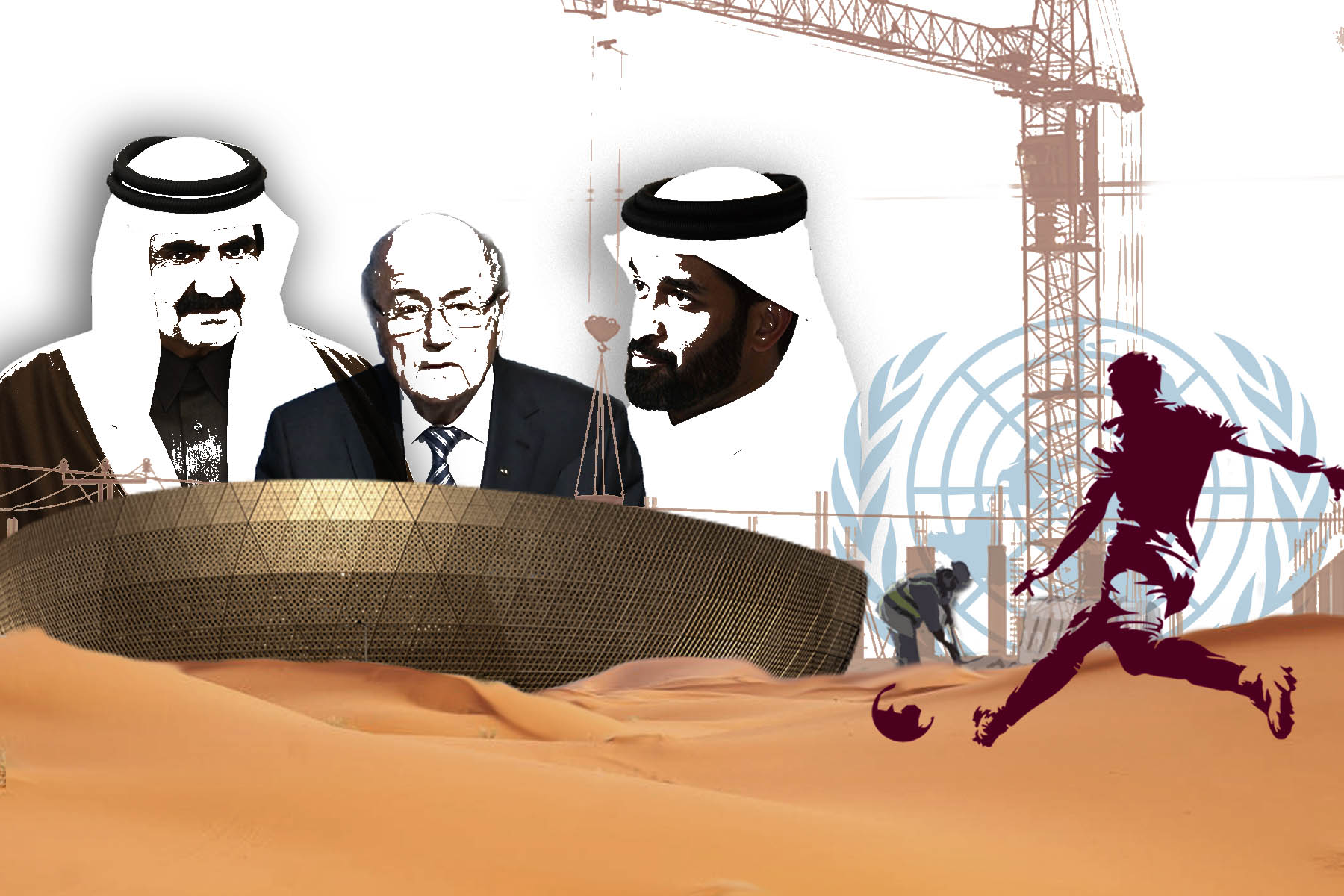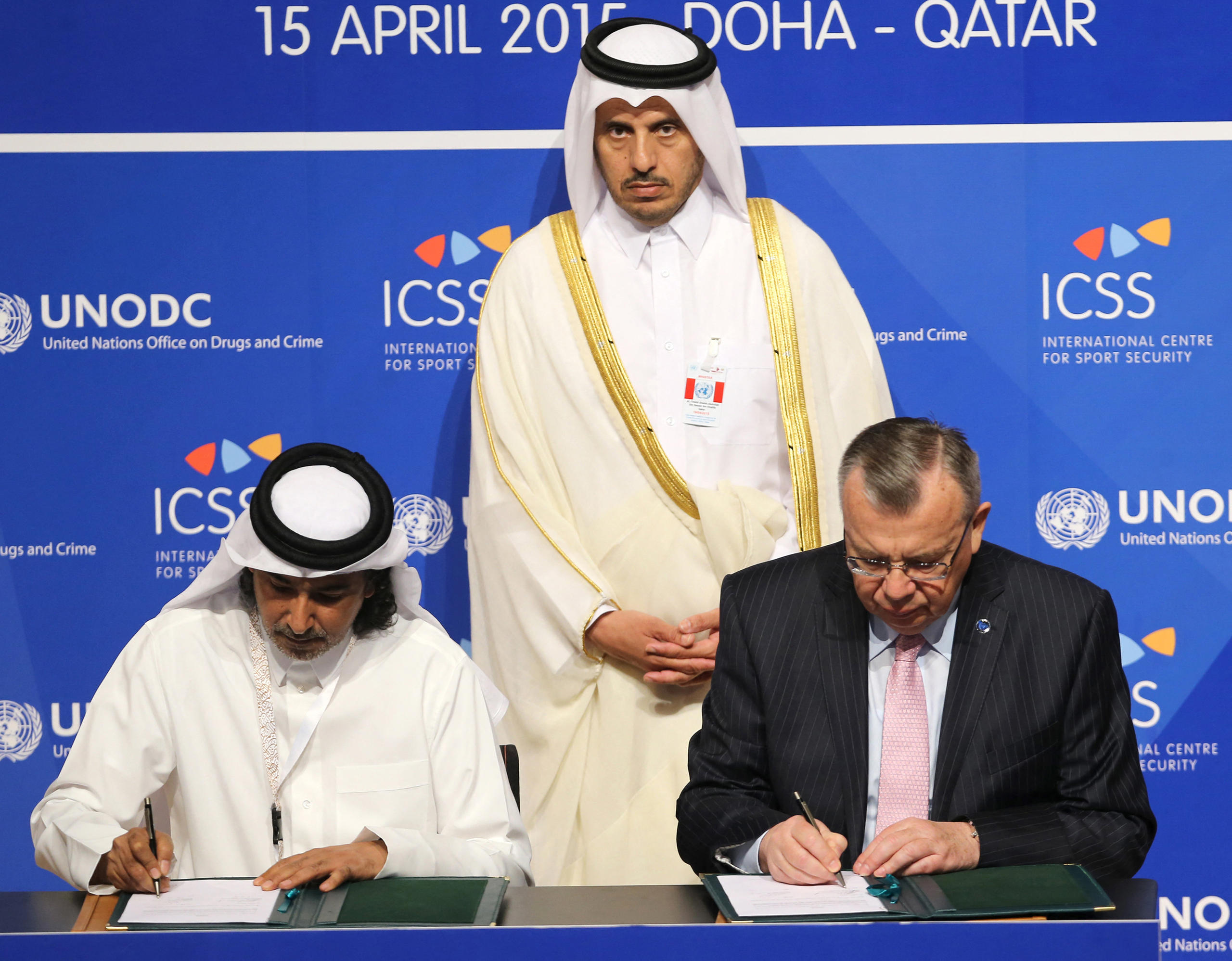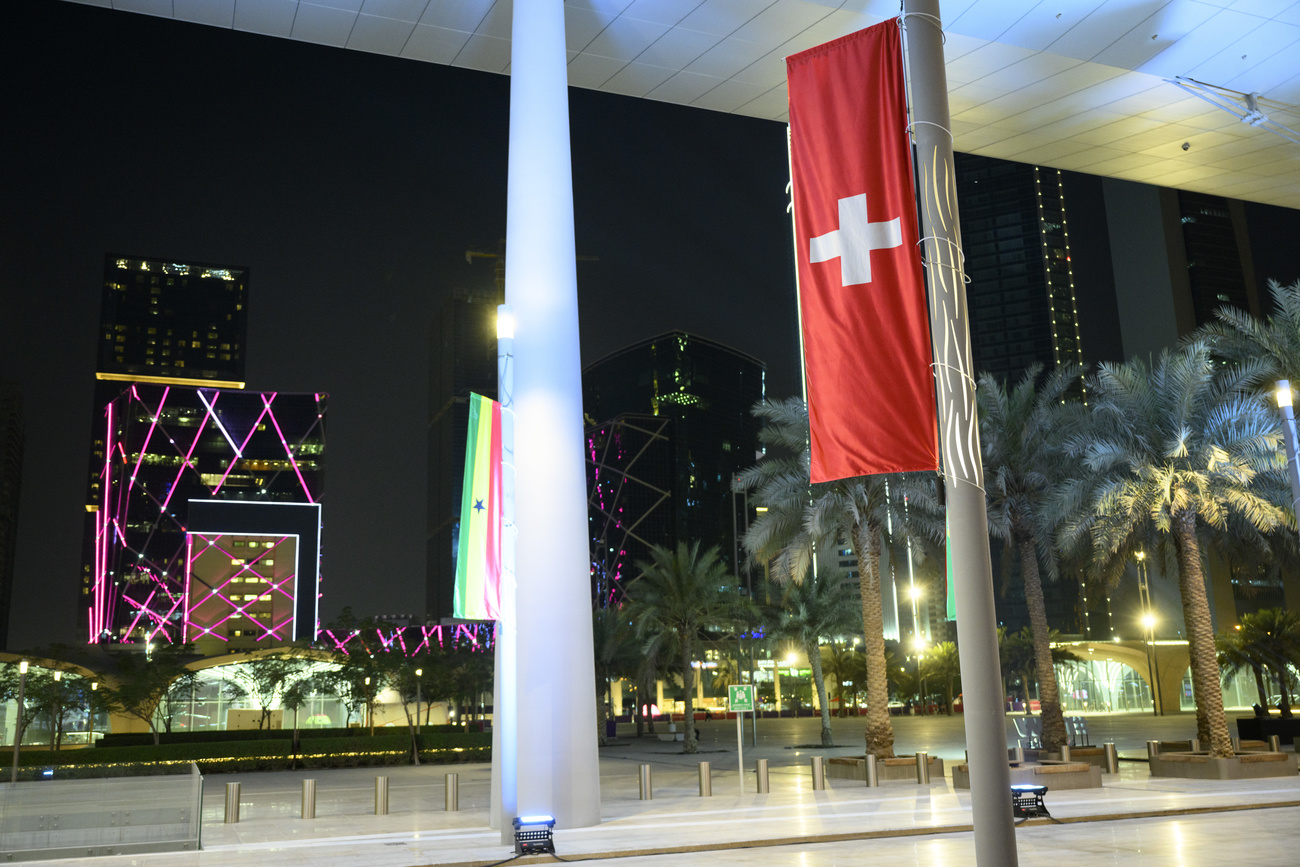UN turns to controversial Qatari to fight corruption

The United Nations has signed an agreement to fight global corruption with a former Qatari prosecutor, Ali Bin Fetais Al-Marri. Well-known in the international community of Geneva, Al-Marri is the subject of several legal complaints, including for corruption and money laundering.
The announcement drew little attention. On November 4, 2022, in Geneva, UN Assistant Secretary-General Nikhil Seth signed a partnership agreementExternal link with the Global Organisation of Parliamentarians Against Corruption (GOPAC), chaired by Ali Bin Fetais Al-Marri, a former attorney general of Qatar.
The cooperation agreement, signed by GOPAC and the United Nations Institute for Training and Research (UNITAR), aims to strengthen the fight against corruption. It includes the development and publication of an anti-corruption training manual for parliamentarians around the world, according to documents published by a Geneva-based organisation, Observatoire Géostratégique de Genève. In 2023 and 2024, officials will hold training workshops and roundtables “to discuss this endemic scourge [corruption] in various countries, exchange experiences and propose ways to address it,” reported the Qatari news website qna.org, which intensively covered the event.
While the initiative is commendable, the UN’s decision to collaborate with Al-Marri is questionable. The integrity of this 58-year-old magistrate, who was Qatar’s public prosecutor from 2002 to 2021, has been called into doubt on numerous occasions in recent years, both in the international press and in books about the emirate. He is, or has been, the subject of several legal complaints, notably in Switzerland, France, the UK and the US.
The choice of GOPAC also raises questions. It presents itself as an organisation founded in 2002 that unites 170 parliamentarians from various countries to “fight corruption and promote good governance”. However, there is very little information on its activities over the past 20 years. Its website has not been updated since 2011 “due to a lack of resources”. At the time of writing, the homepage reads simply: “New website under development. Something interesting is coming!”

Two requests for information to UNITAR have not been answered.
A private hotel in Paris
It is however known that Sheikh Ahmed Khalid Bin Mahammad Bin Ali At-Thani, a distant member of Qatar’s ruling family, filed a legal complaint against Al-Marri in Paris and Switzerland for “money laundering” at the end of 2021. A judge has only recently been appointed to investigate this complaint in Paris, as a person close to the case confirmed to SWI swissinfo.ch. In the complaint, the sheikh mentions “suspicions of corruption, influence peddling, misappropriation of public funds and money laundering abroad”.
Another complaint was filed in France for “arbitrary detention” by Jean-Pierre Marongiu, a French businessman. The latter accuses the former Qatari attorney general of being responsible for his arrest and conviction on spurious grounds. Marongiu was locked up in a Qatari prison for almost five years between 2013 and 2018, accused of “issuing bad cheques and violating a ban on leaving the country” – charges he rejects.
The Frenchman, whom we met in Paris, explains that under a system of guardianship called “kafala” specific to Arab Gulf nations, Sheikh Faysal Bin Jassim Al-Thani, a member of the Qatari royal family, was a 51% majority shareholder in his company – although he had not invested a cent in it. The sheikh allegedly swindled Marongiu, who ended up in prison with Al-Marri’s complicity. Marongiu tells the story in two books (1).
Gilles-William Goldnadel, a leading Parisian lawyer, is defending the plaintiffs in these two cases.
More recently, in December 2022, the French member of parliament Philippe Latombe referred the matter to the financial public prosecutor in Paris. He alludes to suspicious financial transactions by Al-Marri. According to Latombe, the latter received a monthly salary equivalent to €12,000 (CHF11,760) as a prosecutor, but in 2013 he acquired a private hotel in Paris for €9.6 million.
The same year, he also acquired a property in Cologny, in canton Geneva, for just over CHF7 million. Then, in 2015, he purchased a building in Grand-Saconnex, also in canton Geneva, for almost CHF3.7 million. For Latombe, there are reasons to “suspect the existence of a system of corruption and influence peddling”.
Al-Marri is also implicated in some books about Qatar. In Le vilain petit Qatar. Cet ami qui vous veut du mal (Nasty Little Qatar: The Friend Who wants to Hurt You) (2), Nicolas Beau and Jacques-Marie Bourget describe him as the man who does the dirty work of the ruling family. “At the request of the Doha palaces, he is the one who legally executes troublemakers, prosecuting them for corruption, which is hardly difficult,” the authors write.
Published in the autumn of 2022, the book Qatar, les secrets d’une influence planétaire (Qatar, Secrets of Planetary Influence) (3) also notes that Al-Marri intervened in the US “to obtain the release of two members of his family who fought in the ranks of Al-Qaeda in Afghanistan and are incarcerated at Guantanamo”.
Unresolved complaints
To date, Al-Marri has not been bothered by the courts. The investigation opened in Switzerland for misuse of corporate assets and money laundering, following the complaint lodged by Sheikh Ahmed Khalid Bin Mahammad Bin Ali At-Thani, was closed by the Office of the Attorney General of Switzerland in April 2022.
The prosecutor said: “It is clear from the proceedings that the funds used by Al-Marri to purchase various properties in Geneva came from accounts opened in his name, and financed from his personal wealth accumulated in Qatar”. Consequently, “there was no intention to conceal the origin of the funds”.
On the French side, lawyers for Al-Marri pleaded transparency. “In Paris, as in Geneva, everything is in Mr. Ali Bin Fetais Al-Marri’s name, whereas ill-gotten gains are generally camouflaged in companies where the names of the real owners do not appear,” said the lawyers, whom SWI swissinfo.ch met in Paris. “Mr. Ali Bin Fetais Al-Marri’s income is much higher than the given sum of €12,000,” they added. “His fortune comes from various real estate investments made in Qatar over the past 20 years. Like most landowners in Qatar, Dr. Fetais Al-Marri has realised capital gains from the emirate’s impressive economic growth and soaring property prices.”
During the interview, Al-Marri’s lawyers referred to recent press articles describing a “judicial and media offensive against the emirate” in France. One of the latest of these is a long, multi-part investigation published in early February in the French daily Libération, titled “Suspicions of Foreign Interference: Bahrain’s Shadow Over Corruption Accusations Against Qatar in FranceExternal link,” and illustrated with a photo of Al-Marri. “The former prosecutor general has been the victim of a smear campaign for many years, based on no serious evidence,” his lawyers said.
Complaints filed in the UK and US are still pending.
A mailbox in Geneva
However, some questions remain unanswered, including his place of residence when he was still officially a prosecutor in Qatar. The building in Grand-Saconnex was acquired in the name of a company, GSG Immobilier SA, which was created on October 26, 2015. Its owner, Al-Marri, declared at the time that he was domiciled in Cologny, as we were able to find out from the commercial register. At that time, however, he was in charge of the Qatari judiciary.
From 2017, this building housed the Rule of Law and Anti-Corruption Center (ROLACC). This organisation was founded in Doha in 2009 by Al-Marri himself, and its mission was to fight corruption. ROLACC was part of the vast marketing operation launched by Qatar to position itself at the UN after winning the bid to host the 2010 football World Cup. Among other things, the organisation allied itself with the United Nations Office on Drugs and Crime (UNODC).

More
Qatar’s Swiss hub for foreign policy
For several years ROLACC’s website has displayed pictures of empty seats. In 2021, it abandoned its offices at route de Ferney in Grand-Saconnex to withdraw to a simple mailbox belonging to the company Eversheds Sutherland at rue du Marché in Geneva. We sent two messages to ROLACC, which is now headed by a member of the former prosecutor’s family. To date, there has been no response.
Asked in November 2022 by SWI swissinfo.ch about the accusations against him and the activities of ROLACC, Al-Marri said the institute was now based in Qatar. “I have no idea [about the accusations against me] — I fight corruption,” he said.
Text reviewed and checked by Virginie Mangin and Pauline Turuban/ds
Qaptif. Un Français otage du QatarExternal link and Aussi noire que soit ma nuit, je reviendrai vers toi, Éditions Les Nouveaux Auteurs.
Le vilain petit Qatar. Cet ami qui vous veut du malExternal link, Éditions Fayard, April 2013
Le Qatar en 100 questions, les secrets s’une influence planétaireExternal link by Christian Chesnot, Éditions Tallendier

In compliance with the JTI standards
More: SWI swissinfo.ch certified by the Journalism Trust Initiative













You can find an overview of ongoing debates with our journalists here . Please join us!
If you want to start a conversation about a topic raised in this article or want to report factual errors, email us at english@swissinfo.ch.